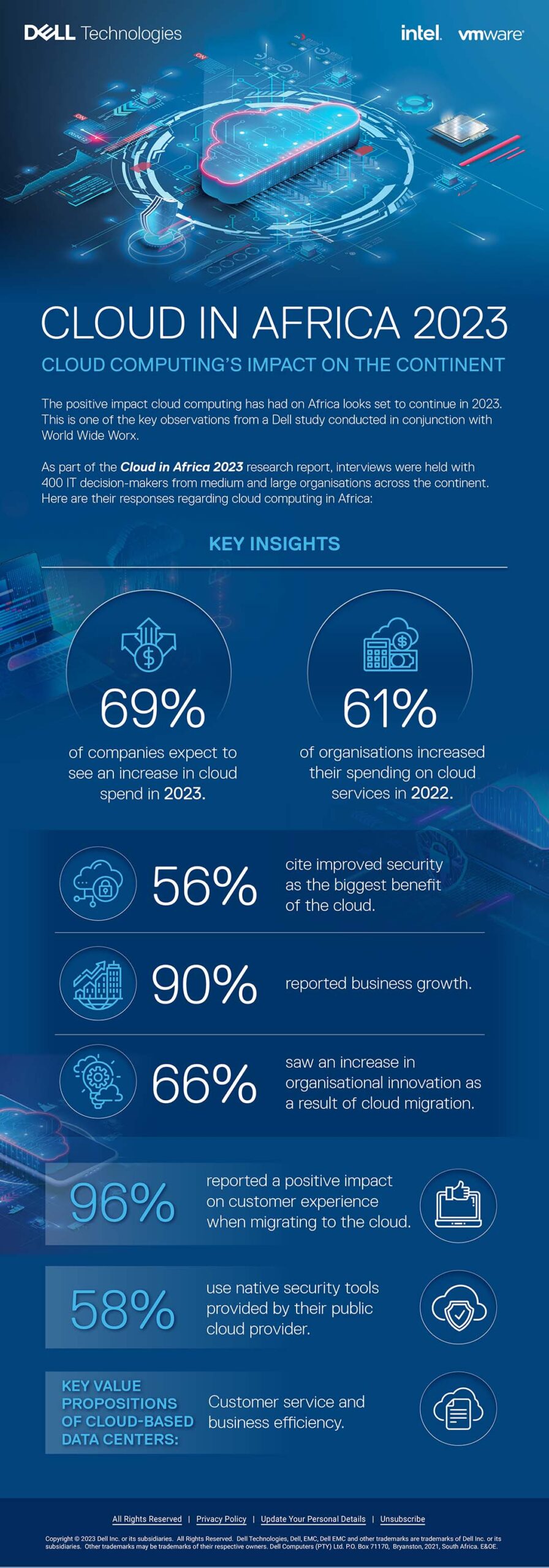More than two-thirds of companies using cloud computing across major African markets plan to increase their spending on cloud services in 2023.

Doug Wooley, MD of Dell Technologies for South Africa.
This was one of the most significant findings of the Cloud in Africa 2023 study released today by World Wide Worx, with support from Dell Technologies, F5, Intel, Red Hat, and VMware. The study, based on interviews with 400 information technology decision makers in medium and large organisations across Africa, found that 69% of respondents expect to see an increase in cloud spend, and only 7% expect spend to decrease.
In 2022, 61% of companies increased their spend on cloud services, while only 3% decreased spend.
“We thought that cloud spending might be toned down in the wake of the massive adoption that took place in 2020 and 2021,” says World Wide Worx CEO Arthur Goldstuck, principal analyst on the research project. “Instead, the opposite was the case.”
Doug Wooley, MD of Dell Technologies for South Africa, said the study revealed the extent to which cloud computing had become part of the DNA of business.
“Any company dealing with a large customer base, or an ecosystem of suppliers and clients, must embrace the cloud if they expect to operate both efficiently and cost-effectively. The key to benefiting from a cloud deployment is to choose a partner with solutions that can simplify deployment and management of hybrid cloud infrastructure – and that’s where Dell Technologies can help. It is a multicloud world and IT leaders want best-of-breed capabilities to achieve differentiated outcomes. They love the ease and agility of the cloud experience and expect it everywhere,” says Wooley.
The single biggest benefit reported by respondents in the survey was in an area most often cited as a barrier by those who have not yet adopted the cloud: security. Yet, more than half of respondents – 56% cited improved security as the biggest benefit of the cloud. This tallied with another finding of the survey, on the question of the greatest concerns of cloud users: a negligible proportion named security as a major concern.
“I believe we are overdue for a shift in understanding that cloud deployments can be secure if properly implemented. According to the statistics in this research, the cloud provides peace of mind as well,” explains Ian Jansen van Rensburg, Director of Solutions Engineering & Lead Technologist at VMware Sub-Saharan. “In addition, as the study demonstrates, both customer and business service efficiency are substantially enhanced when the cloud is utilised.”
These benefits were cited, respectively, by 44% (customer service) and 41% (business efficiency) of respondents, marginally ahead of scalability, at 40%. The latter is one of the key value propositions of the data centres that are proliferating across the continent, promising to allow businesses to scale up their capacity on demand, as seasonal peaks disrupt conventional computing infrastructure.
“It is no coincidence that Intel recently announced a range of new scalable processors designed for data centres,” said Intel South Africa country manager Nitesh Doolabh. “It is precisely that benefit – scalability – that gives the cloud the power to enhance efficiency and customer service.”
Even more significant benefits were uncovered when companies were asked about the impact of cloud migration.
Goldstuck said: “The most important finding for enterprises was that 90% of respondents reported business growth, with 43% seeing strong growth. Fewer than 10% said that business had stayed the same or declined. This makes it clear that cloud technology is not tech for its own sake, but has a clear value proposition for business.”
Business growth, in turn, is a consequence of two further areas of impact of migration to the cloud: innovation and improved customer service.
Just under half of respondents, 48%, reported a high impact on innovation, with a further 23% reporting some impact: i.e., more than two thirds saw innovation increasing in the organisation. Fewer than 1% said the cloud had a negative impact on innovation.
Customer experience was the big winner: 64% reporting extremely positive impact and a further 32% somewhat positive impact. Less than half a percent reported a negative impact on customer experience resulting from cloud migration.
“That tells us why business growth is such a significant consequence of cloud migration,” says Woolley. “At Dell, we have always recognised that computing must be a vehicle for businesses to meet the needs of their markets and to enhance customer service. The research shows that the cloud more than meets such criteria, which is fully in line with our approach of enabling organisations to successfully deploy and manage cloud environments that are private, public or both.”
Other key findings:
The main criteria for selecting a cloud provider is not necessarily the presence or the price of the provider, but rather the quality of service and, more important, ongoing quality of service. An assumption is that regulatory compliance such as data sovereignty is critical, but this was the least important factor cited by respondents. More than half cited quality of service and almost a quarter cited the service portfolio. Well behind that came price, and then local presence or proximity to the data centre.
A relatively small proportion of respondents had significant difficulties in cloud adoption, with just more than two thirds saying that they did not have difficulties in cloud adoption. For the rest, the most significant difficulty was lack of skills, followed not far behind by costs exceeding budgeted forecasts.
On key security concerns in the cloud, an extremely high proportion, 73%, said none. The 27% who did have concerns were led by 10% who were concerned about data breaches, the single biggest concern. A little behind that came compliance, at just under 6% of respondents.
To protect applications in the cloud, a high proportion were dependent on the cloud provider, with 58%, saying that they use native security tools provided by the public cloud provider. Just under a third said that they use third party security products provided to the public cloud marketplace.
While cloud adoption is now pervasive, cloud strategy continues to evolve across the continent, especially as data centres are now becoming more pervasive, connectivity coverage is improving, and more companies are beginning to make contingency plans for power outages and the like.
Says Goldstuck: “This means we can expect a steady growth in multi-cloud strategy as well as increasing strategies of combining on-premise with cloud storage and applications. Especially given the importance of customer experience, the ability to run applications on-premise when facing connectivity issues, as occurs regularly in power outages, will be an essential option.”

